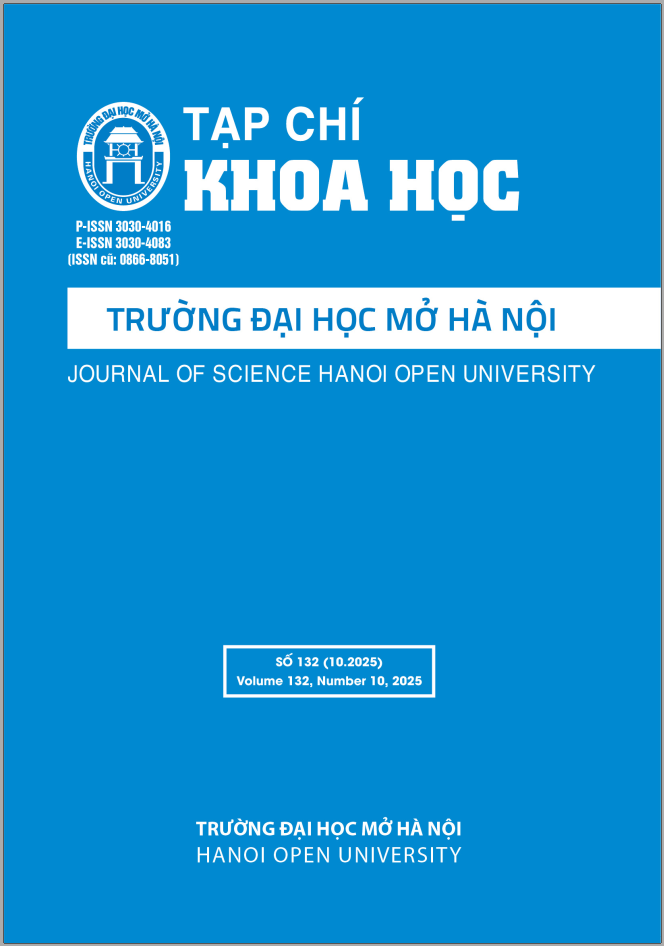PROBIOTIC CHỈNH SỬA GEN - TIỀM NĂNG VÀ ĐỊNH HƯỚNG ỨNG DỤNG
DOI:
https://doi.org/10.59266/houjs.2025.849Keywords:
probiotic chỉnh sửa gen, CRISPR-CasAbstract
Probiotic chỉnh sửa gen là thế hệ vi sinh vật trị liệu mới, tạo ra bằng kỹ thuật chỉnh sửa hệ gen chính xác trên các chủng truyền thống. Sự phát triển của công cụ di truyền, đặc biệt là CRISPR-Cas, cho phép lập trình probiotic nhằm tăng khả năng chịu đựng, mở rộng chức năng sinh học và tối ưu hóa hiệu quả điều trị. Dù đã ứng dụng trong công nghiệp thực phẩm và lâm sàng, hiệu quả chưa đồng nhất và cơ chế tác động chưa rõ vẫn hạn chế việc mở rộng ứng dụng. Bài báo tập trung vào công nghệ chỉnh sửa gen, đặc biệt là CRISPR-Cas, trong thiết kế probiotic tùy biến để điều trị các bệnh phức tạp như viêm ruột, nhiễm khuẩn, rối loạn chuyển hóa và ung thư, qua đó nhấn mạnh tiềm năng của công nghệ sinh học trong phát triển liệu pháp vi sinh vật và chẩn đoán bệnh.
References
[1]. Aggarwal, N., Breedon, A. M. E., Davis, C. M., Hwang, I. Y., & Chang, M. W. (2020). Engineering probiotics for therapeutic applications: Recent examples and translational outlook. Current Opinion in Biotechnology, 65, 171-182. https://doi.org/10.1016/j. copbio.2020.02.016.
[2]. Bikard, D., & Barrangou, R. (2017). Using CRISPR-Cas systems as antimicrobials. Current Opinion in Microbiology, 37, 155-160. https://doi. org/10.1016/j.mib.2017.08.005.
[3]. Bron, P. A., van Baarlen, P., & Kleerebezem, M. (2012). Emerging molecular insights into the interaction between probiotics and the host intestinal mucosa. Nature Reviews Microbiology, 10(1), 66-78. https://doi. org/10.1038/nrmicro2690.
[4]. Brophy, J. A. N., & Voigt, C. A. (2014). Principles of genetic circuit design. Nature Methods, 11(5), 508-520. https://doi.org/10.1038/nmeth.2926.
[5]. Canale, F. P., Basso, C.,Antonini, G., Perotti, M., Li, N., Sokolovska, A., Neumann, J., James, M. J., Geiger, S., Jin, W., Theurillat, J-P., West, K. A., Leventhal, D. S., Lora, J. M., Sallusto, F., & Geiger, R. (2021). Metabolic modulation of tumours with engineered bacteria for immunotherapy. Nature, 598(7882), 662-666. https://doi. org/10.1038/s41586-021-04003-2.
[6]. Chowdhury, S., Castro, S., Coker, C., Hinchliffe, T. E., Arpaia, N., & Danino, T. (2019). Programmable bacteria induce durable tumor regression and systemic antitumor immunity. Nature Medicine, 25(7), 1057-1063. https:// doi.org/10.1038/s41591-019-0498-z.
[7]. Dou, J., Wang, Y., Wang, X., Fu, X., Zhang, Z., & Zhang, J. (2021). Engineered probiotics: potential strategies in the treatment of inflammatory bowel disease and colitis- associated colon cancer. Frontiers in Pharmacology, 12, 742171. https://doi. org/10.3389/fphar.2021.742171.
[8]. Goh, Y. J., & Klaenhammer, T. R. (2013). Genetic mechanisms of prebiotic oligosaccharide metabolism in probiotic microbes. Annual Review of Food Science and Technology, 4, 377-399. https://doi.org/10.1146/ annurev-food-030212-182545.
[9]. Hidalgo-Cantabrana, C., O’Flaherty, S., & Barrangou, R. (2017). CRISPR- based engineering of next-generation lactic acid bacteria. Current Opinion in Microbiology, 37, 79-87. https://doi. org/10.1016/j.mib.2017.03.014.
[10]. Hsu, P. D., Lander, E. S., & Zhang, F. (2014). Development and applications of CRISPR-Cas9 for genome engineering. Cell, 157(6), 1262-1278. https://doi.org/10.1016/j. cell.2014.05.010.
[11]. Isabella, V. M., Ha, B. N., Castillo, M. J., Lubkowicz, D. J., Rowe, S. E., Millet, Y. A., Anderson, C. L., Li, N., Fisher, A. B., West, K. A., Reeder, P. J., Momin,
M. M., Bergeron, C. G., Guilmain, S. E., Miller, P. F., Kurtz, C. B., & Falb, D. (2018). Development of a synthetic live bacterial therapeutic for the human metabolic disease phenylketonuria. Nature Biotechnology, 36(9), 857-864. https://doi.org/10.1038/nbt.4222.
[12]. Jinek, M., Chylinski, K., Fonfara, I., Hauer, M., Doudna, J. A., & Charpentier, E. (2012). A programmable dual-RNA- guided DNA endonuclease in adaptive bacterial immunity. Science, 337(6096), 816-821. https://doi.org/10.1126/ science.1225829.
[13]. Kurtz, C. B., Millet, Y. A., Puurunen, M. K., Perreault, M., Charbonneau, M. R., Isabella, V. M., Kotula, J. W., Antipov, E., Dagon, Y., Denney, W. S., Wagner, D. A., West, K. A., Degar, A. J., Brennan, A. M., & Miller, P. F. (2019). An engineered E. coli Nissle improves hyperammonemia and survival in mice and shows dose-dependent exposure in healthy humans. Science Translational Medicine, 11(475), eaau7975. https:// doi.org/10.1126/scitranslmed.aau7975.
[14]. Li, M., Ma, Y., Chen, J., & Wang, L. (2021). Application of synthetic biology tools to engineer probiotic lactic acid bacteria. Current Opinion in Biotechnology, 70, 61-69. https://doi. org/10.1016/j.copbio.2021.03.005.
[15]. Liu, L., Helal, S. E., & Peng, N. (2023). CRISPR-Cas-based engineering of probiotics. BioDesign Research, 2023, 5, 0017. https://doi.org/10.34133/ bdr.0017.
[16]. Makarova, K. S., Wolf, Y. I., Iranzo, J., Shmakov, S. A., Alkhnbashi, O. S., Brouns, S. J. J., Charpentier, E., Cheng, D., Haft, D. H., Horvath, P., Moineau, S., Mojica, F. J. M., Scott, D., Shah, S. A., Siksnys, V., Terns, M. P., Venclovas, C., White, M. F., Yakunin, A. F., ... & Koonin, E. V. (2020). Evolutionary classification of CRISPR-Cas systems: a burst of class 2 and derived variants. Nature Reviews Microbiology, 18(2), 67-83. https://doi.org/10.1038/s41579- 019-0299-x.
[17]. Oh, J. H., & van Pijkeren, J. P. (2014). CRISPR-Cas systems: new tools for genetic manipulations of lactic acid bacteria. Current Opinion in Biotechnology, 31, 62-70. https://doi. org/10.1016/j.copbio.2014.07.001.
[18]. Pusch, O., Kenngott, R. A.-M., Schönherr, M., & Schulze, K. (2021). Probiotic yeast Saccharomyces boulardii engineered to secrete Clostridium difficile toxin-neutralizing proteins. Microbial Cell Factories, 20, 190. https://doi.org/10.1186/s12934-021-01691-y.
[19]. Wang, L., Hu, J., Li, K., Zhao, Y., & Zhu, M. (2024). Advancements in gene editing technologies for probiotic- enabled disease therapy. iScience, 27(9), Article 110791. https://doi.org/10.1016/j.isci.2024.110791.
[20]. Zhang, C., Liu, X., Wang, H., & Liu, C. (2022). Advances in engineering probiotics for the detection and treatment of inflammatory bowel diseases. Biotechnology Advances, 58, 107887. https://doi.org/10.1016/j.biotechadv.2022.107887.
[21]. Zhou, X., Wang, X., Luo, H., Wang, Y., Wang, Y., Tu, T., Qin, X., Su, X., Bai, Y., Yao, B., Huang, H., & Zhang, J. (2021). Exploiting heterologous and endogenous CRISPR-Cas systems for genome editing in the probiotic Clostridium butyricum. Biotechnology and Bioengineering, 118(7), 2448-2459. https://doi.org/10.1002/bit.27753.
